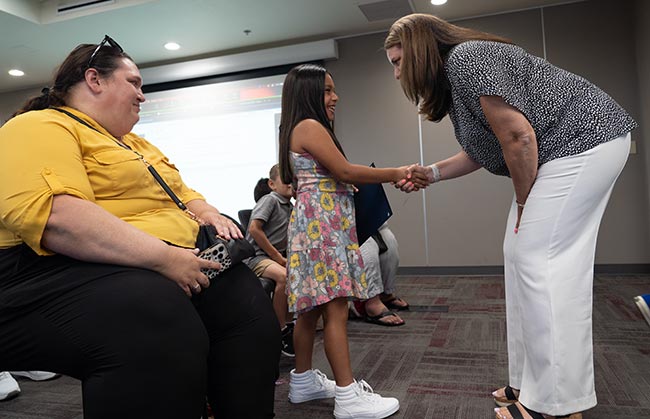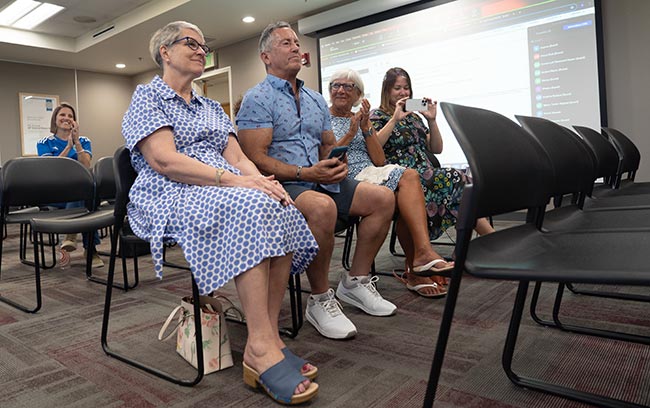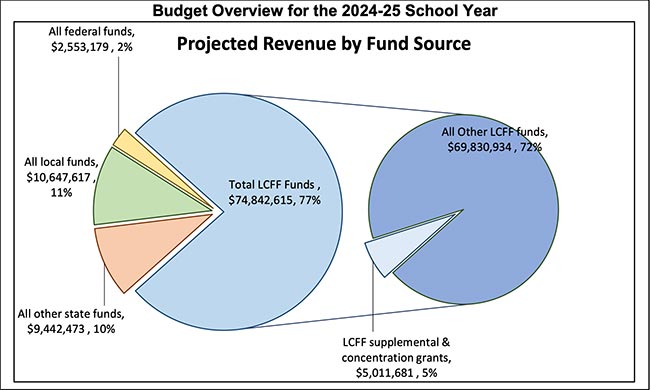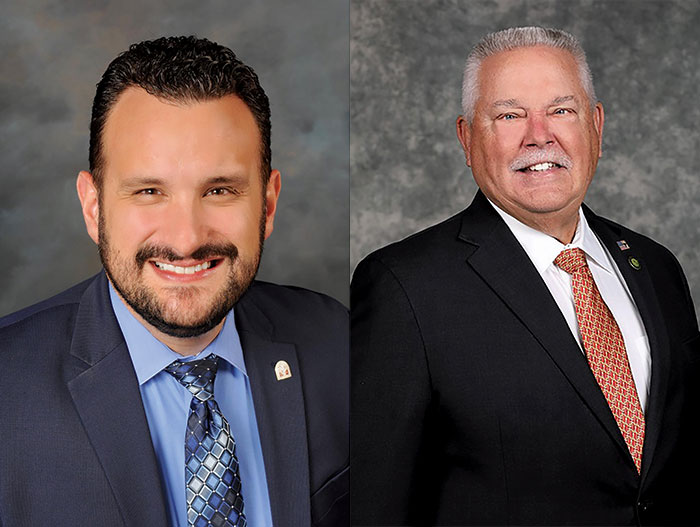CUSD Board of Education passes new budget, LCAP

Elizabeth Hayward, center, shakes hands with CUSD Board member Kathy Archer during the June 20 meeting, while Elizabeth’s mother, Victoria Hayward, looks on. The 9-year-old was recognized for organizing a toy drive for students in the foster care system. Courier photo/Andrew Alonzo
by Andrew Alonzo | aalonzo@claremont-courier.com
At its final meeting of the school year Monday, the Claremont Unified School District Board of Education unanimously passed its budget for the 2024-2025 fiscal year and a new local control and accountability plan spanning 2024 to 2027.
The items were introduced for a reading and held for a hearing during the June 20 board meeting before Monday’s final approval at a special meeting.
The meetings capped the 2023-2024 CUSD school year and Dinah Felix’s two year tenure as assistant superintendent of business services with the district. Felix will join the Rowland Unified School District as its assistant superintendent of administrative services on July 1.
LCAP
The first important measure passed Monday was CUSD’s local control accountability plan, or LCAP, a three-year plan that outlines how California school districts and charter schools intend to meet “annual goals and specific actions to address state and local priorities to support outcomes for all students and student groups,” which was agenda item 5.02.
The LCAP is a required component of the state’s Local Control Funding Formula, or LCFF, that must be passed on or before July 1 of each year. It must be revisited, amended and approved every year by the Board of Education and submitted to the Los Angeles County Office of Education by July 1 for approval.
A draft 2024-2027 LCFF and LCAP was posted at cusd.claremont.edu/page/lcff-lcap on May 24 after receiving community input over the last several months. To view the LCAP, go to cusd.claremont.edu and click “LCAP” in the top right.
This recent LCAP examined “goals, actions, and services” within year one, 2024-2025.
“Goals are The CUSD Commitment Focus Areas aligned with the CA State Priorities,” read a staff presentation. “The CUSD Commitment strategies are included in the actions of the LCAP.”
Some of the actions and services outlined in goal one, which emphasizes CUSD focus area one — academic achievement and instruction — include, “commit with fidelity to districtwide initiatives that support the teaching of content area standards and curriculum,” and “develop, modify, and implement policies and practices to reduce disproportionate enrollment of Foster Youth and students experiencing homelessness in an alternative education setting by creating clear and consistent criteria for transfer recommendations that do not disproportionately impact these students such as credit deficiencies and enrollment mid-term.”

Retiring Director of Education Services June Hilton, front left, was honored with the You Are the Commitment Award during the June 20 CUSD Board meeting. Next to Hilton (L-R) is her cousin George Biagi, sister, Janice Callaghan, and niece, Megan Callaghan. Courier photo/Andrew Alonzo
Actions in the second goal, pertaining to CUSD focus areas two, three, and four — the whole child, access and equity, and student and staff safety and wellness, respectively — read in part, “create mentorship opportunities for Foster Youth by connecting them to local college programs who serve Foster Youth,” “support attendance and school stability of students experiencing homelessness and Foster Youth by utilizing alternative means of transportation, e.g. Hop Skip Drive,” and “Identify, analyze, and monitor relevant data points to adjust as necessary in ensuring graduation improvement for Foster Youth and students experiencing homelessness.”
Additional highlights include providing vape sensors in secondary school restrooms, adding more cameras to El Roble Intermediate and San Antonio High School, and establishing an attendance task force to address absenteeism.
A few of the highlights of the third main LCAP goal, meant to address CUSD focus area five of engaged families and community partners, include, “strengthen communication with schools to promote awareness on supporting Foster Youth and their families,” “continue to support and grow the Foster Youth Advisory Council and create a District webpage to support initiatives,” and to “conduct a comprehensive evaluation to determine the feasibility of establishing a Child and Adult Care Food Program (CACFP) supper site at Vista, aimed at addressing food insecurity and promoting healthy nutrition among students.”
Lastly, goal four criteria, which aligns with CUSD focus area six — optimized financial and human resources — stated in part, “communicate the District’s fiscal status and outlook at each reporting period with the Board of Education and Educational Partners,” “monitor and communicate enrollment and attendance rates to ensure that multi-year revenue projections reflect changes as needed,” “continue to identify Low-Income Students, English learners, Free or Reduced-Price Meals Students, and Foster Youth to ensure adequate funding, and to “explore options to integrate nutrition education into existing curriculum in collaboration with Educational Services.”
The LCAP goals are meant to address some of the 10 overall LCFF priorities set forth by the California Department of Education. The first goal aims to address LCFF priorities two, four, seven, and eight: implementation of state standards, student achievement, course access, and student outcomes. The second is for LCFF priorities five, six, and eight. Priority five is student engagement while number six is school climate. The third goal is meant to focus on LCFF priority three, parent involvement. And the fourth goal revolves around LCFF priority one, or basic services.
Additional details regarding the four goals are provided in a presentation attached to the June 20 agenda.
Budget
After last week’s LCAP hearing, the board addressed how the district planned to pay for all its priorities and projects during the subsequent 2024-2025 budget talks.
The following text, taken from a funding breakdown attached to the June 24 special meeting agenda, was modified for clarity: CUSD plans to spend $102,374,701 (including $1,091,817 in transfers out) of total budget general fund expenditures for the 2024-25 school year. Of that amount, $87,275,462 is tied to actions and services as part of the LCAP. The $15,099,239 figure that’s not included in the LCAP will be used for “district/site personnel such as special education paraprofessionals, support staff, custodians, media assistants, and maintenance personnel, as well as the overhead of facilities, utilities and legal expenditures.”
Not all federal, state, and state COVID-19 relief funds are included in the LCAP.

Claremont Unified School District’s 2024-2025 budget overview. Graphic/courtesy of CUSD
“The total revenue projected for Claremont Unified School District [in 2024-2025] is $97,485,884.00, of which $74,842,615.00 is [from the] Local Control Funding Formula (LCFF), $9,442,473.00 is other state funds, $10,647,617.00 is local funds, and $2,553,179.00 is federal funds. Of the $74,842,615.00 in LCFF Funds, $5,011,681.00 is generated based on the enrollment of high needs students (foster youth, English learner, and low-income students),” according to the funding breakdown.
Revenue ($97,485,884) minus expenditures ($102,374,701) for next school year leaves CUSD about $4.9 million in the red, which it will cover using its $14.2 million in reserve funding. The district is projected to use $3.3 million of unrestricted general fund reserves and $1.6 million of restricted general fund reserves to address the shortfall.
The math leaves CUSD with about $9,325,938 as the projected beginning balance in 2025-2026, which includes both restricted and unrestricted balances, of which $3.1 million is the required 3% reserve for economic uncertainties, as required by California Education Code.
The projected funding breakdown for fiscal years 2024-2027 are attached to the June 24 special meeting agenda. Visit cusd.claremont.edu, click “board of education” at the top and then “board meeting agenda/live stream” in the middle of the page. On the new webpage, click the “special meeting of the board of education” option and then the “agenda” tab in the top right. Scroll down for the subsequent documents.








0 Comments